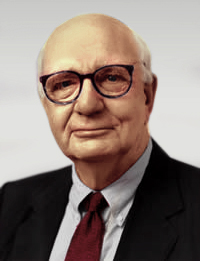Paul Volcker
| Paul Volcker | |
|---|---|
 |
|
| Chair of the President's Economic Recovery Advisory Board | |
|
In office February 6, 2009 – February 6, 2011 |
|
| President | Barack Obama |
| Preceded by | Position established |
| Succeeded by | Jeff Immelt (Council on Jobs and Competitiveness) |
| Chair of the Federal Reserve | |
|
In office August 6, 1979 – August 11, 1987 |
|
| President |
Jimmy Carter Ronald Reagan |
| Deputy |
Frederick Schultz Preston Martin Manley Johnson |
| Preceded by | William Miller |
| Succeeded by | Alan Greenspan |
| President of the Federal Reserve Bank of New York | |
|
In office May 2, 1975 – August 5, 1979 |
|
| Preceded by | Alfred Hayes |
| Succeeded by | Anthony Solomon |
| Personal details | |
| Born |
Paul Adolph Volcker, Jr. September 5, 1927 Cape May, New Jersey, U.S. |
| Political party | Democratic |
| Spouse(s) | Barbara Bahnson (1954–1998) Anke Dening (2010–present) |
| Children | 2 (with Bahnson) |
| Alma mater |
Princeton University Harvard University London School of Economics |
Paul Adolph Volcker, Jr. (born September 5, 1927) is an American economist. He was Chairman of the Federal Reserve under Presidents Jimmy Carter and Ronald Reagan from August 1979 to August 1987. He is widely credited with ending the high levels of inflation seen in the United States during the 1970s and early 1980s. He was the chairman of the Economic Recovery Advisory Board under President Barack Obama from February 2009 until January 2011.
Volcker was born in Cape May, New Jersey, the son of Alma Louise (née Klippel) and Paul Adolph Volcker. All of his grandparents were German immigrants. Volcker grew up in Teaneck, New Jersey, where his father was the township's first municipal manager. As a child, he attended his mother's Lutheran church, while his father went to an Episcopal church. Volcker graduated from Teaneck High School in 1945.
Volcker's undergraduate education was at Princeton University; he graduated in 1949. He earned his M.A. in political economy from Harvard University's Graduate School of Arts and Sciences and Graduate School of Public Administration in 1951 and then attended the London School of Economics from 1951 to 1952 as a Rotary Foundation Ambassadorial Fellow, under the Rotary's Ambassadorial Scholarships program.
...
Wikipedia
